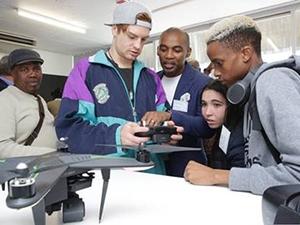
SAP's innovation platform, SAP Next-Gen, has collaborated with the University of Cape Town's (UCT) School of information technology to launch the Next-Gen Lab, with the aim of finding inventive solutions to real-world issues.
The SAP Next-Gen program is an innovation platform for the SAP ecosystem enabling companies, partners and universities to connect and innovate with the objectives linked to the UN Global Goals - to share ideas around using exponential technologies.
The Next-Gen Lab, a collaboration between SAP Next-Gen and UCT's School of IT, incorporates the Department of Information Systems in the Faculty of Commerce and the Department of Computer Science in the Faculty of Science.
Through its partnership with UCT, SAP says it aims to create a physical space on campus that takes a non-traditional approach to the classroom environment, to create a platform where students can interact with companies and gain insight into industry-related disruptive innovation. Students will be given an opportunity work on solving problems faced by local firms in digital transformation initiatives while being provided with ICT skills, adds SAP.
Professor Ulrike Rivett, director of the school of IT, believes the Lab is an opportunity for the university to contribute to meaningfully solving problems in the ICT industry.
"Too often, interactions between business and our students are geared mainly towards recruitment. While initiatives that assess the skills of students are important, these generally miss the opportunity of utilising the available pool of creative talent to co-create inventive solutions to real-world issues."
The 2016 ICT skills survey by the Centre for Software Engineering found that there is an increasing demand for skilled labour in the local ICT sector - with the skills gap expected to get worse in the medium to long-term.
According to the Deloitte 2017 Millennial Survey, 84% of South African millennials believed automation is rapidly becoming a feature of working environments.
"SA's young and talented millennial workforce is ready to contribute in meaningful ways to overcoming the challenges ahead. We believe that by empowering young people and enabling them to expand their professional networks, we are giving them a launch pad to break beyond academic theory and gain real-life experience with the latest technology and business strategies," says professor Ingrid Woolard, dean of the Faculty of Commerce.
"We wanted to create a space where students can interact with companies and work on industry-related challenges, next-generation projects, and blue-sky ideas. It's a co-creation and working space built on design-thinking principles to stimulate and encourage innovative thinking, collaboration, and knowledge-sharing."
According to Ann Rosenberg, senior vice president and Global Head of SAP Next-Gen, many companies are realising that looking only inward for innovation is not sufficient to meet the demands of effective digital transformation.
"We are pleased to support SA as a country and Africa as a continent with building up a digitally educated next-generation talent pool with skills on both enterprise systems and digital innovation with analytics, machine learning, blockchain technology and more.
"SAP Next-Gen is a key part of enabling this, as the program connects customers to academic thought leaders and researchers, students, start-ups, accelerators, tech community partners, purpose driven partners, venture firms, futurists, and SAP experts to reimagine the future of industries with SAP Leonardo, seed in disruptive innovation with startups, and build skills for digital futures," says Rosenberg.
During last year's Youth Day celebrations, the then public enterprises minister Lynne Brown encouraged the youth to pursue studies in maths and science to attain the necessary ICT skills required by some of the country's state-owned companies which are in need of pilots, engineers, accountants and lawyers, among others.
Share